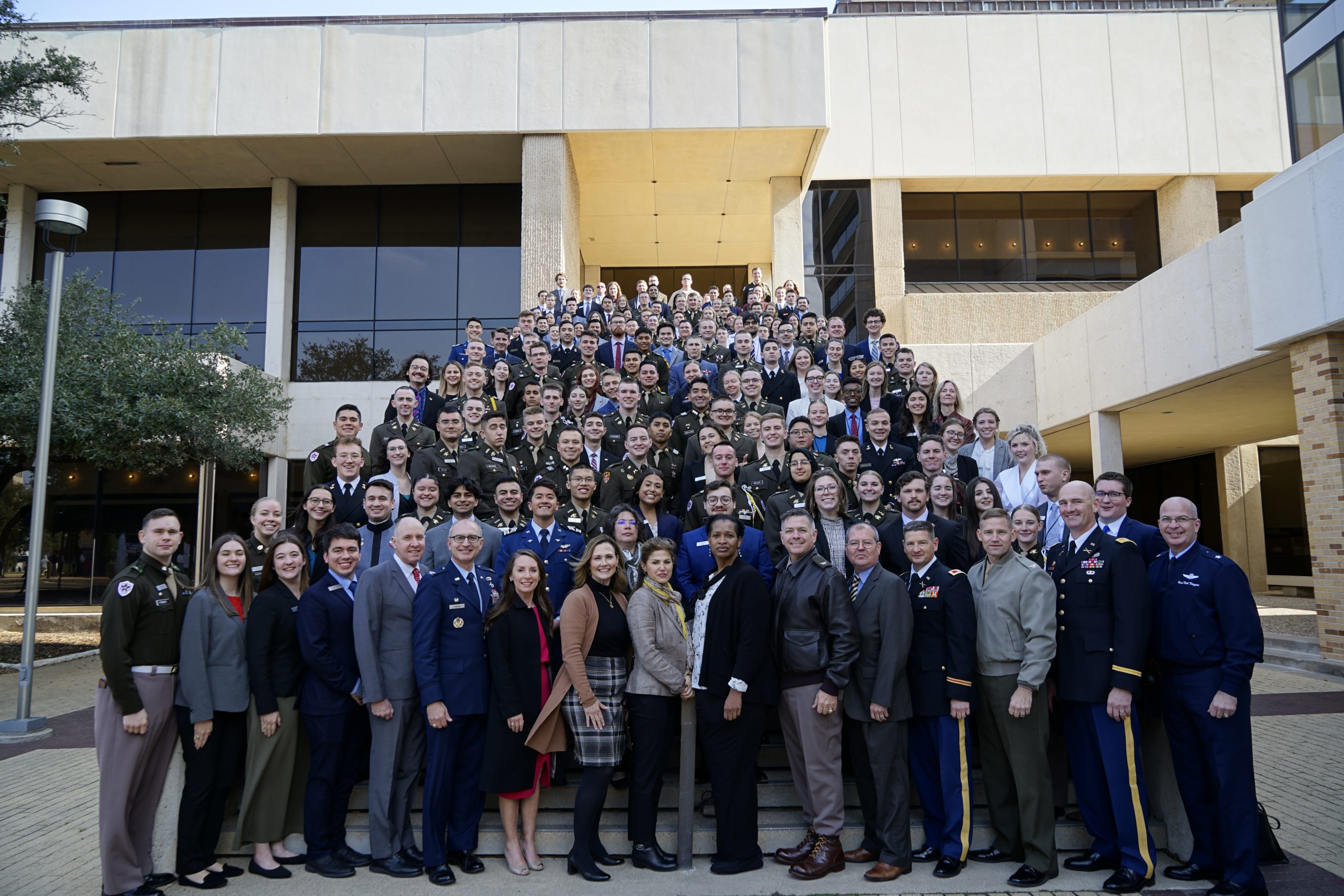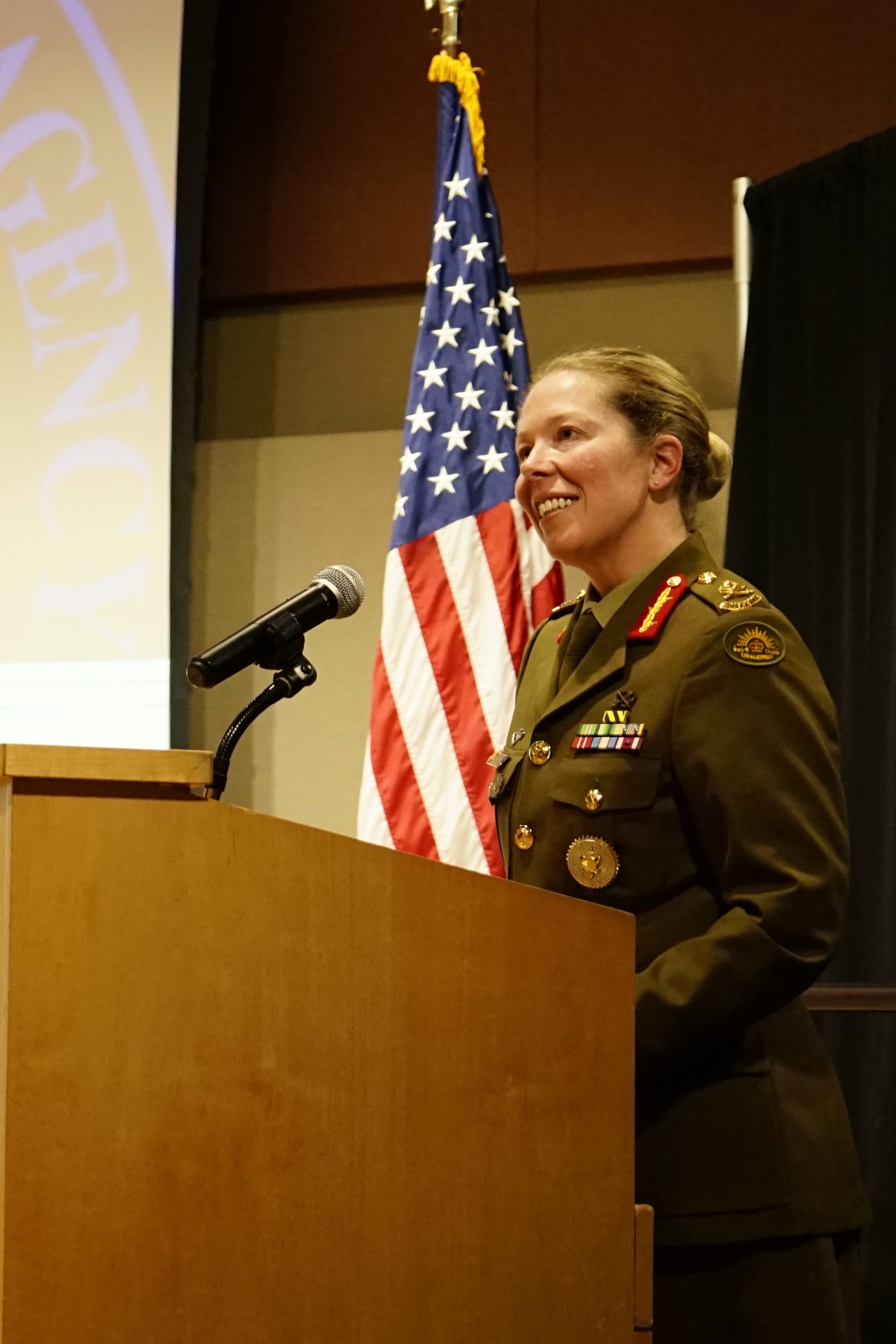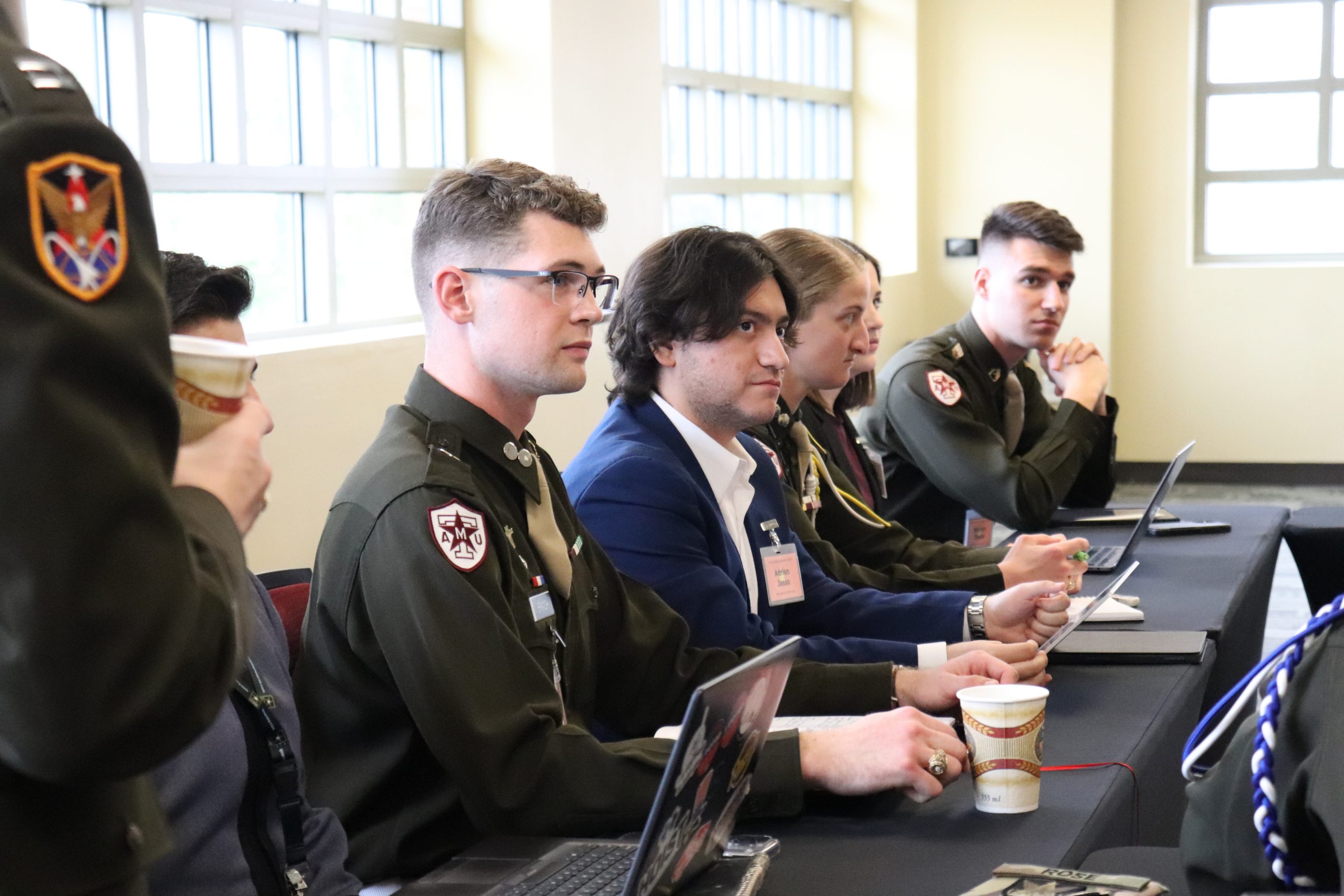A Pure Example of Texas Aggie Selfless Service
The MSC Student Conference On National Affairs gives students the chance to learn and lead.

MAJGEN Michelle McGuinness, Australian Army at MSC SCONA 68.
Photo provided by MSC Student Programs.
By Dorian Martin ’06
Rapidly changing global dynamics and stressors—such as the COVID-19 pandemic, the Russian invasion of Ukraine, terrorism and changing geopolitical alliances—can lead to far-ranging consequences for the United States. Thanks to Texas A&M University’s annual MSC Student Conference On National Affairs (MSC SCONA), collegiate student delegates—many of whom are considering careers in policy organizations, the military or affected industries—have an opportunity to delve into these pressing issues and begin analyzing far-ranging implications.
The prestigious conference brings together top U.S. and international diplomatic and military leaders, premier academic scholars, and leading industry professionals to help inform the conference’s conversations. For example, MSC SCONA 68 focused on the theme, “Hanging in the Balance: American Leadership in Global Crises.”
Participants delved into the changing geopolitical tectonics created by the Russian invasion of Ukraine and the possibility of a new Cold War as China and Russia strengthen their ties. To provide context to delegates, MSC SCONA 68’s keynote speakers included retired U.S. Air Force Col. Michael E. Fossum ’80, former NASA astronaut and Texas A&M’s vice president and chief operating officer at Texas A&M University Galveston; retired U.S. Air Force Gen. Tod D. Wolters, who served as NATO’s Supreme Allied Commander Europe and Commander of U.S. European Command; and Maj. Gen. Michelle McGuiness of the Australian Army, deputy director for Commonwealth Integration at the U.S. Defense Intelligence Agency; and John Hennessy-Niland, former U.S. ambassador to Palau and professor of the practice at the Bush School of Government and Public Service.
Student delegates who represent on average 20 colleges and universities participate in small group “roundtables” facilitated by subject matter experts. These discussions serve as inspiration for policy papers delegates develop on specific topics. In 2023, these policy papers addressed issues including U.S. sales of military arms to foreign countries, energy independence, rebuilding war-torn Ukraine, and creating resilient supply chains and infrastructure.
Mindful of the current partisan split in the United States, MSC SCONA also encourages delegates to create dialogue instead of relying on partisan talking points. “The goal is to find common ground so we can create a policy paper at the end of the conference,” said Joseph Muir ’21 ’23, MSC SCONA 68’s chair.
Leading the Way
MSC SCONA is one of a few premier collegiate policy conferences in the nation; similar ventures are hosted at the U.S. military service academies. Texas A&M’s conference, the second oldest in the nation, is modeled on the United States Military Academy West Point’s Student Conference on U.S. Affairs (SCUSA). The Texas A&M conference started after two Corps of Cadets members attended SCUSA in 1955 and decided to replicate the effort.
Over the years, Texas A&M’s conference has grown and is now bigger than the ones hosted by the military academies. The conference differs in that it is entirely student-led. “That speaks to our ability as Texas A&M students to get things done. We are truly student-run, student-led, student-motivated,” said Ethan Finney ’24, MSC SCONA 68’s vice chair for communications and will chair MSC SCONA 69. “We believe in this conference and know there’s a spot for MSC SCONA on this campus.”
Involvement in MSC SCONA is also growing across campus. The conference, which has traditionally had strong attendance by the Corps of Cadets, is now engaging more student veterans, as well as students from the College of Engineering and the Bush School of Government and Public Service. Organizers plan to invite more students from other Texas A&M schools and colleges to future events.

Student Involvement
The MSC SCONA committee is responsible for organizing the conference, giving its members valuable experience in the complexities of planning a premier event. Responsibilities include identifying the conference theme and speakers, marketing, and working with MSC staff and advisers on planning and logistics. These efforts help apply and polish leadership, critical thinking, business, and active listening skills.
Student participant speaking at MSC SCONA 68
Photo provided by MSC Student Programs.
The committee is also responsible for annual fundraising. The conference charges a nominal registration fee for student delegates, but these funds do not fully cover meals, printed materials, facilities, and keynote speakers. Any additional funds raised are used to offset these expenses, as well as conference costs for the delegates.
Organizers also learn how to be flexible and pivot when the conferences don’t go as planned. As an example, Muir first joined MSC SCONA during his junior year and worked with 50 other Aggies to organize the event. He was selected to serve as MSC SCONA 65’s director of technology and—because of the sudden emergence of the COVID-19 pandemic—was responsible for rapidly transitioning the conference to hybrid event with half of the delegates attending in-person and half virtually.
That was not the only challenge that the conference has faced. This year, one of MSC SCONA 68’s keynote speakers was called to testify before Congress and had to withdraw at the last minute, leaving MSC SCONA organizers scrambling. Fortunately, they were able to reach out to Col. Fossum, a previous MSC SCONA keynoter, who was available to step in on short notice.
A One-of-a-Kind Student Experience
Because it is a student-run conference, MSC SCONA gives Aggie organizers an opportunity to build ties with top leaders who will be attending the conference. For example, Finney served as the point of contact for Maj. Gen.David Hill, commandant of the U.S. Army War College and MSC SCONA 67’s keynote speaker. When the conference date arrived, Finney experienced genuine and personal interactions with Hill, including taking the general and his Army War College staff on a tour of the MSC, organizing their lunch and assisting them as they listened to the roundtable discussions. “They weren’t here for a photo op; they weren’t here to check a box that the Army told them to,” Finney explained. “They were here because they believed in what we were doing in inspiring students at our level to ask these questions and to genuinely think about these problems and see how we can solve them.”

This type of experience also helps MSC SCONA members think more deeply about their future careers in terms of public service. For example, Muir studied computer engineering as an undergraduate and planned to focus his career on robotics. However, MSC SCONA changed his trajectory, causing him to enroll in a master’s program in computer science after he completed his bachelor’s degree. “I feel that the cybersecurity realm is a good path for me going forward,” he said. “Through my involvement in MSC SCONA, I’ve realized how important that area is for our own individual security on the web and as a nation and the world. I want to find ways to keep our systems safe from malicious actors, whether they are one-off people in basements in Eastern Europe or very sophisticated malicious actors sponsored by foreign adversaries.”
Student participants and industry leaders speaking at a roundtable discussion at MSC SCONA 68.
Photo provided by MSC Student Programs.
Embracing Aggie Values and Teamwork
Both Muir and Finney also credit MSC SCONA for deepening their understanding of the Aggie core values. “I think MSC SCONA is a pure example of selfless service,” Muir said. “No matter where you are in MSC SCONA, if you are truly engaged and dedicated to the organization, then you are living selfless service.”
Finney believes MSC SCONA also highlights the Aggie core value of excellence. “Excellence to me means quality and greatness,” he explained, pointing to the conference’s continued prominence on Texas A&M’s campus for 69 years. “Every year, we strive for a quality conference. When we look at speakers and facilitators for our roundtables, we are looking at the value that we can bring to our delegates.”
And participating on the MSC SCONA committee gives Aggies a chance to learn more about the importance of teamwork. “MSC SCONA is not at all a one-person show,” Muir said. “The chair, no matter how many great ideas he has or how much presence he has, cannot run the entire thing by himself. You must have your board of directors, your leadership team and the committee to support you. The saying is, “It takes a village.” Well for MSC SCONA, it takes a committee. Without them, I am just the guy with the idea.”
Make an online donation to MSC SCONA now or learn about other giving methods from Reagan Chessher ’96, senior director of development, at (979) 862-1247 or [email protected].

